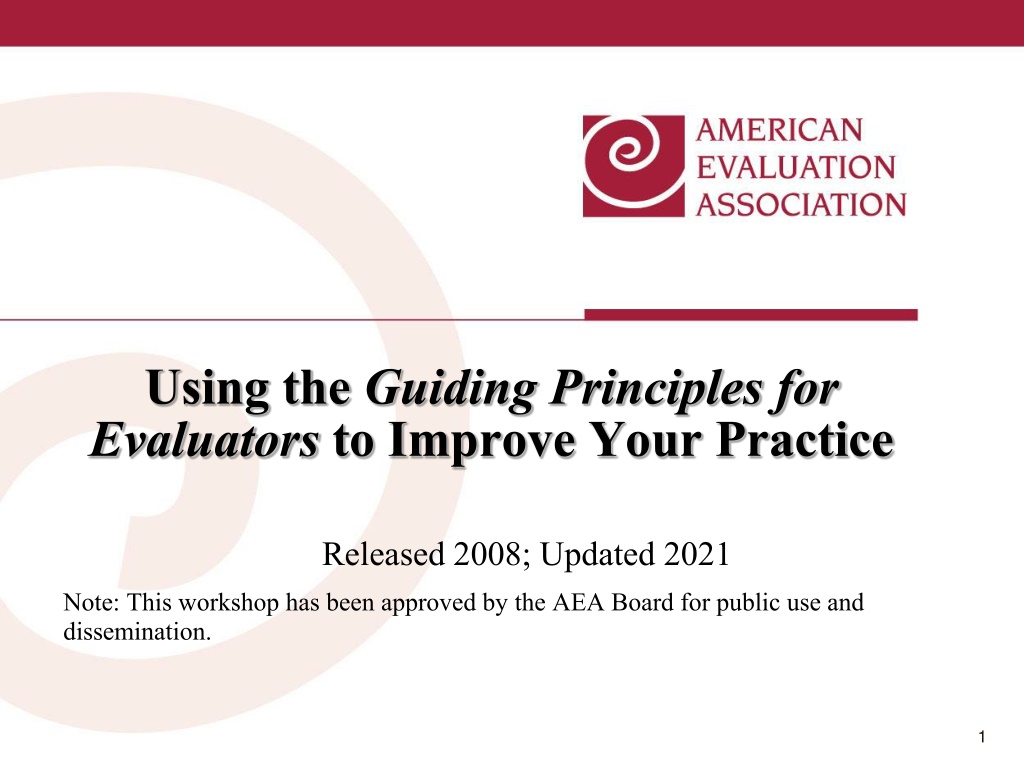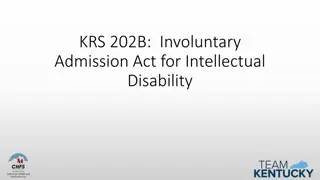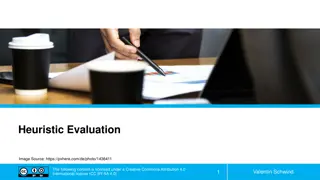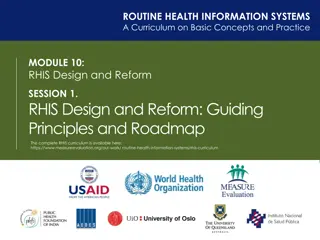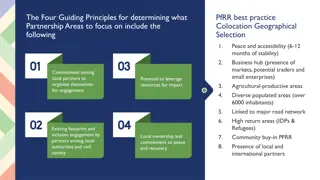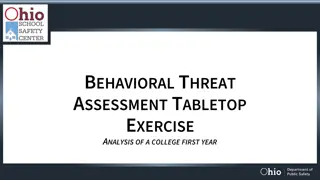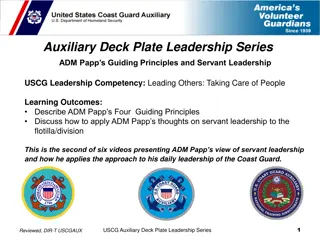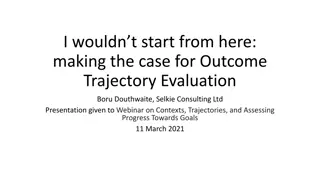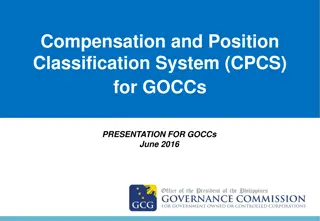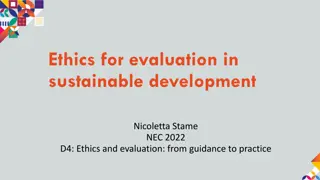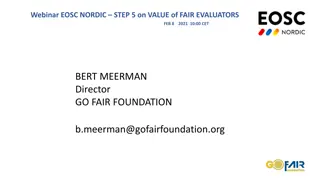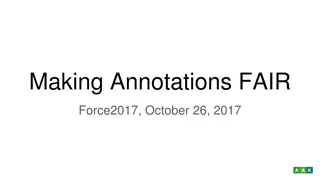Understanding the Guiding Principles for Evaluators
This content provides insights into the Guiding Principles for Evaluators, including their history, assumptions, and key principles such as Systematic Inquiry and Competence. The workshop aims to increase knowledge about ethical evaluation practices and stimulate discussions within the evaluation community. By following these principles, evaluators can enhance the quality and effectiveness of their evaluations.
Uploaded on Oct 02, 2024 | 0 Views
Download Presentation

Please find below an Image/Link to download the presentation.
The content on the website is provided AS IS for your information and personal use only. It may not be sold, licensed, or shared on other websites without obtaining consent from the author. Download presentation by click this link. If you encounter any issues during the download, it is possible that the publisher has removed the file from their server.
E N D
Presentation Transcript
Using the Guiding Principles for Evaluators to Improve Your Practice Released 2008; Updated 2021 Note: This workshop has been approved by the AEA Board for public use and dissemination. 1
Objectives of Workshop Increase knowledge of the AEA Guiding Principles for Evaluators (GP) Analyze the Guiding Principles in a program evaluation context Consider how the Guiding Principles can be used to inform ethical evaluation practice 2
History of Guiding Principles 1986: Founding of American Evaluation Association 1993-1994: Original five Guiding Principles for Evaluators developed and ratified 2016-2018: Guiding Principles most recently reviewed and updated 2018: Revised Guiding Principles endorsed through referendum of AEA membership 3
Assumptions behind the Guiding Principles Purposes of the Guiding Principles Promote ethical evaluation practice Foster continuing professional development Stimulate discussion within and outside evaluation Evaluators aspire to provide best possible information that might bear on the value of whatever is being evaluated 4
Assumptions behind the Guiding Principles The Guiding Principles: Proactively guide everyday practice Cover all kinds of evaluation Are not independent, but overlap May sometimes conflict; need to consider trade-offs The Guiding Principles were developed in the context of the United States 5
Principle A: Systematic Inquiry Evaluators conduct systematic, data-based inquiries: Adhere to highest technical standards Explore strengths and shortcomings of evaluation questions and approaches Communicate approaches, methods and limitations accurately 6
Principle B: Competence Evaluators provide competent performance to stakeholders: Possess appropriate skills and experience Demonstrate cultural competence Practice within limits of competence Continually improve competencies 7
Principle C: Integrity/Honesty Evaluators display honesty and integrity and attempt to ensure them throughout the entire evaluation process: Negotiate honestly with clients and stakeholders Disclose values, interests and conflicts of interest Represent accurately methods, data and findings Disclose source of request and financial support for evaluation 8
Principle D: Respect for People Evaluators respect security, dignity and self- worth of all stakeholders: Understand evaluation context Get informed consent and protect confidentiality Maximize benefits and minimize harm Foster social equity Respect differences among stakeholders 9
Principle E: Common Good and Equity Evaluators strive to contribute to the common good and advancement of an equitable and just society: Balance stakeholders' interests and the common good Address the evaluation s potential threats to the common good Address the evaluation s potential risks of exacerbating historic inequity Promote transparency and active sharing Mitigate bias and potential power imbalances 10
Case Studies for Small Group Work Summary of actual evaluation cases, adapted for discussion Cases include all phases of evaluation All details could not be included in summary 11
Instructions for Small Group Work Individually: 1)Read the complete case study 2)Identify issues or questions that relate to each Guiding Principle 3)Record issues/questions on work sheet 12
Instructions for Small Group Work As a Group: 1)Identify main issues to report 2)Record on flipchart and choose a reporter 3)Discuss how the Guiding Principles relate to the evaluation summarized in the case study 13
Reporting Out from Small Groups Summarize small group reports what are similarities and differences across groups? 14
Large Group Discussion How can you use the Guiding Principles as you design and conduct your own evaluations? How can the Guiding Principles inform the ethical practice of evaluation? 15
Professional Support Resources Colleagues: Evaluation colleagues and faculty who teach evaluation AEA Local Affiliates and Topical Interest Groups (TIGs) 16
Professional Support Resources Selected Journal Articles: Levin-Rozalis, M. (2015). A Purpose Driven Action: The Ethical Aspect and Social Responsibility of Evaluation. New Directions for Evaluation, Volume 146. Morris, M. (2015) Research on evaluation ethics: reflections and an agenda. New Directions for Evaluation, Volume 148. Morris, M. (2018). A War + A Decision = A Future in Evaluation Ethics? New Directions for Evaluation, Volume 157. 17
Professional Support Resources Selected Books: Donaldson, S. & Picciotto, R. (eds) (2016). Evaluation for an Equitable Society. Kara, H. (2018). Research Ethics in the Real World: Euro- Western and Indigenous Perspectives. Mertens, D. & Ginsberg, P. (2008). Handbook of Social Research Ethics. Morris, M. (2007). Evaluation Ethics for Best Practice. Tyler, R. (1941). General Statement on Evaluation. Tyler, R. (1991). Evaluation and Education at a Quarter Century. 18
Professional Support Resources Selected Resources on Culturally Responsive Evaluation: AEA Statement of Cultural Competence in Evaluation (2011) http://www.eval.org/ccstatement.asp Center for Culturally Responsive Evaluation and Assessment https://crea.education.illinois.edu/ 19
Other Resources for Guiding Evaluation Practice Meta-evaluation Checklist for AEA Guiding Principles for Evaluators http://www.wmich.edu/evalctr/archive_checklists/guidingpri nciples2005.pdf Program Evaluation Standards, 3ndEdition (2011) http://www.jcsee.org/program-evaluation-standards Personnel Evaluation Standards , 2ndEdition (2008) http://www.jcsee.org/personnel-evaluation-standards International Organisation for Cooperation in Evaluation (IOCE) http://www.ioce.net 20
About the Training Package Originally developed by AEA Ethics Committee Professional Development Task Force: 2006/2007 Ethics Committee: Jules Marquart, Leslie Goodyear, Dennis Affholter, Scott Rosas, Valerie Caracelli Other AEA members: Marcie Bober, Denice Cassaro, Edie Cook, Randall Davies, Amy Germuth, Tom Grayson, Kelly Hannum, Judith Inazu, Bill Rickards, Rita O Sullivan, Stephanie Schneider, Linda Schrader, Veronica Thomas, Jennifer Williams, Brian Yates Updated most recently by Leanne Kallemeyn, Leslie Goodyear, Sarah Heath, Monica Ruiz-Casares, Melanie Hwalek, Herb Baum, Xiaoxia Newton, Jeffrey Hillman 21
Workshop Evaluation Wrap-up Now it s up to you to use the Guiding Principles in your practice! Your turn to give us feedback Please complete and return the evaluation survey https://www.surveymonkey.ca/r/AEAGPTP 22
